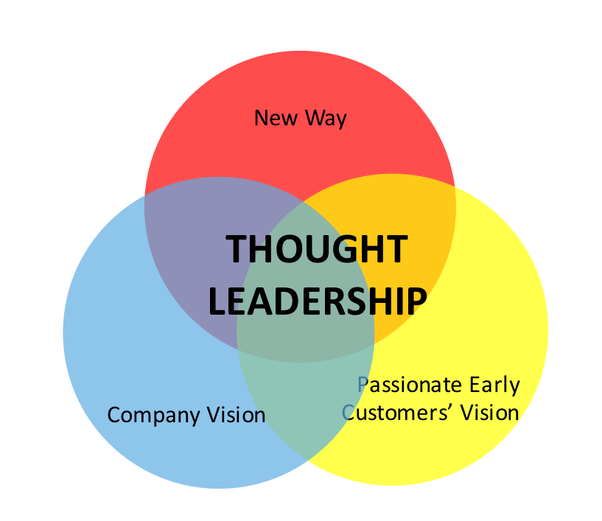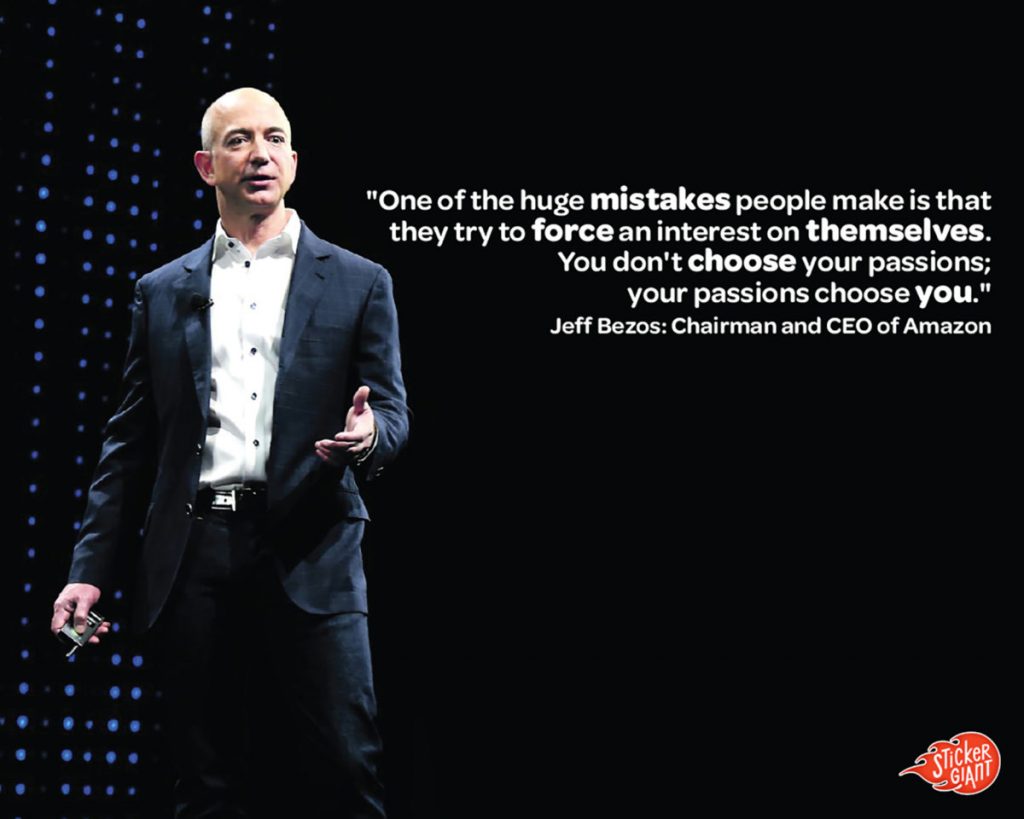The concept of the thought leader can be a controversial topic. It’s one of those buzzwords that people throw about without really thinking about what it means. And this can be challenging, as some people have quite heated views about their personal definition of a thought leader.
Some consider it as merely a flasher-sounding synonym for an influencer. Others believe the two are very different and have quite passionate beliefs on the matter.
When the term first became fashionable, it solely belonged in the business world and didn’t even have any particular connection with the online world. While the phrase still tends to focus on experts on "serious topics," it has very much moved to include those people who demonstrate their expertise on the net. But I still wouldn't think many people would call fashionable online socialites "thought leaders" yet.
What is a Thought Leader?
What is the Definition of a Thought Leader?
Denise Brosseau, of the Thought Leadership Lab, describes thought leadership as being informed opinion leaders and the go-to people in their field of expertise. She considers them to be “trusted sources who move and inspire people with innovative ideas; turn ideas into reality, and know and show how to replicate their success. Over time, they create a dedicated group of friends, fans and followers to help them replicate and scale their ideas into sustainable change not just in one company but in an industry, niche or across an entire ecosystem.”

Source: quora.com
Thought leaders change the world in meaningful ways and engage with others to change their ways. This is quite a level above your everyday leader. They don't just lead. They certainly don't only manage. You can’t even be a thought leader if you merely theorize. To be a thought leader, you have to act – you have to make an impact in your field, and engage with others, encouraging them to learn from your advancements in your field.
Skye Schooley in the Business News Daily takes a more holistic view, and believes, "as a notable expert in a specific company, industry or society, a thought leader is someone who offers guidance and insight to those around them. In other words, a thought leader has a positive reputation of helping others with their knowledge and insight.”
How Do You Become a Thought Leader?
If you look at the narrower definition of a thought leader, then you can’t quickly become a thought leader by choice. It takes time for you to build a reputation that gives you that status. However, if you include thought leadership among your long-term goals, there are certainly ways you can help your progress towards meeting your aims.
You first have to build your knowledge and expertise in a particular niche. In most cases, this will be an ongoing process – subject matter doesn't stand still, and you will have to continually update your understanding of the subject matter as time progresses.
Arguably, you also need a particular character trait to achieve the status of being a thought leader. You need the tenacity and perseverance to make a change in your niche. This might not be about the subject itself (you can't change history, for instance, nor rewrite the laws of nature). But you must be prepared to change the ways you look at and interpret your subject matter. You have to do something truly innovative in your field if you are to be considered a thought leader.

Source: evannex.com
It is much easier to become a thought leader if you have already established your expertise in your field. This is one of the reasons why the term "thought leader" originated in business. The thought leaders of industry had already set up successful corporations, operating in novel and interesting ways. This has another noticeable flow-on effect. If you have already established a successful business, program, or other type of initiative, you will probably already have a community of people who talk about your topic of expertise. They possibly already discuss your achievements.
That doesn’t mean that you have to create something from scratch, however. Many teachers are renowned for being genuinely inspiring thought leaders. Sure, they haven’t altered the content they teach (although they may have influenced the focus of their curriculum). But they have found novel, innovative ways to deliver that content to their students.
This doesn't just apply to a school or academic situation, either. Life coach, Tong Robbins, is renowned for his motivational speeches and seminars. Robbins didn't invent the material he teaches. He simply took heed of the content and used it to motivate others to succeed. He even learned to firewalk and uses it in his seminars. His reputation grew to the point that other life coaches and motivators now talk about Robbins with awe and undoubtedly consider him a prominent thought leader in their industry.
Probably one of the most vital requirements to be a thought leader is to have a clear, defined point of view. Thought leaders don't just report their subject without personal comment. They make thoughtful, original contributions to the conversation on the topic. They also recognize trends in their field of expertise and provide insights to others.
What Do Thought Leaders Have to Do with Influencer Marketing?
In most of our discussion on thought leaders so far, we have focused on the "thought" part of the term – the knowledge and understanding of some specialist topics and the ability to share ideas. However, we can't ignore the "leader" part of the term. Thought leaders aren't boffins who impart their knowledge and views but do little else.
Thought leaders have also to have core leadership skills. They have to inspire others and influence their behavior.
This is one of the reasons why many thought leaders are also top business executives. They have a keen knowledge and passion for the industry in which they operate. In some cases, they virtually built their industry around a key concept or idea. Some thought leaders even discovered the innovation that created their sector or at least moved it forward to a new level. However, these people are also leaders, with the necessary skills to encourage others to help them follow their dream.
But not all thought leaders are in business. Some thought leaders have found that their audience online. They have become online experts in their topic of expertise and developed an audience of people who are also passionate about the subject. These thought leaders have been able to influence their followers, and therefore can rightly be called influencers.
Now, if you as a brand can convince some of these influencers that your product fits into their area of expertise, and worthy of their recommendation, then you should find real opportunities for genuine influencer marketing.
Are All Influencers Thought Leaders?
This begs the question of whether all influencers are thought leaders. If you look at our post on What is an Influencer? you will see that we define an influencer as being someone who has:
- the power to affect the purchasing decisions of others because of his or her authority, knowledge, position, or relationship with his or her audience.
- a following in a distinct niche, with whom he or she actively engages. The size of the following depends on the size of his/her topic of the niche.
With this definition, you could consider the first paragraph as describing the “thought” part of a thought leader, and the second covers the “leader” section.
However, many people have a looser view of what an influencer is. This is emphasized by the mainstream media, who report with glee situations where so-called influencers purportedly do something wrong. Even online sites which should know better happily report on the exploits of “influencers” without ever questioning whether those people genuinely deserve that name. For example, the following reports almost gleefully report on "bad influencer” behavior - How An Instagram Influencer Used IKEA To Fake A Vacation, How an Instagram influencer scammed her followers out of $1.5 million and Debunking 'dangerous' influencer claims wastes doctors' time, says head GP. Who said these people were influencers? Did they ever meet the definition of influencer we use on The Influencer Marketing Hub? It is undoubtedly debatable whether they ever were thought leaders.
In saying that, even we narrow down our influencer definition, and give our take on what we view social media influencers.
Social media influencers are people who have built a reputation for their knowledge and expertise on a specific topic. They make regular posts about that topic on their preferred social media channels and generate large followings of enthusiastic, engaged people who pay close attention to their views.
Even with this definition, it would seem that you would have to be at least pushing towards being a thought leader to be an influencer. Social media influencers still need to have considerable knowledge and expertise on a subject, and they have to be able to push the conversation forward on that topic. Otherwise, why would people bother to follow them?
Perhaps, the area of concern is the definition of a niche or topic of expertise. It is easy to envisage the online experts on serious topics being considered both influencers and thought leaders, subjects such as health, technology, politics, history, philosophy, and indeed virtually every subject taught at the university level. It is much more challenging to consider online influencers in soft topics and popular culture as thought leaders.
Backlash Against the Idea of the Influencer Being the Thought Leader
As we have seen with some of the articles linked to above, influencers are not universally popular. To quote Ryan Kucey in his thought piece, There’s a Difference Between Thought Leaders and Influencers, “Everyone and their dog (literally) is an influencer today. The term influencer is thrown around like confetti at a birthday party.”
The problem is that for too many people, the concept of influencer has changed. Indeed one of the issues is that influencer marketing has become so popular that people call themselves influencers now. And by influencer, they usually mean “I have lots of followers so I must be important."
These people are clearly not thought leaders. They don’t have expertise on any topic, and they don't try to seriously lead the discussion.
Don’t Call Yourself a Thought Leader or an Influencer?
One of the ironic things about being both an influencer and a thought leader is that you should never call yourself either. As Rayn Kucy says in his article, “Would you walk into an interview and upon being asked what your current profession is, claim to be an influencer? How ridiculous is that?”
Genuine thought leaders are influencers somewhere, but not necessarily on social media or an online platform. Not only do they have expertise in a subject, but they also love to share that knowledge with others, and influence thinking on that subject on a macro scale.
Most genuine influencers are thought leaders. They, too, have expertise on a subject and like to share their knowledge.
Self-promoting “influencers” who aren’t actually experts on anything, and don’t lead the conversation are neither genuine influencers nor thought leaders.

Source: dmexco.com
There is also the issue of influencers using visual social media to tell their story. Does this demonstrate leadership? Are they sharing expertise on a topic? Posts on Instagram may look pretty, but do they show thought leadership in the same way that a blog post, online discussion, or in-depth YouTube video could?
Kucy posits, “ Suppose there’s a 20-something female fitness model with 150,000 Instagram followers. In most of her photos, she’s posing in her workout attire in front of a mirror. Once in a while, she’ll share a workout tip or two, but offers little in the way of fitness or nutritional advice. Is she an influencer? I’d argue not. Who and what is she influencing? What value does she provide to her audience? Why do people follow her?" Ignoring some inherent sexism in the example, he does have a good point. Who is the more significant thought leader in the sector: the fitness model described above or a personal trainer with 80,000 followers with a degree in kinesiology and a certification in nutrition?
The other real difficulty comes with people who genuinely lead the conversation on topics that the academics and purists may consider trivial and unimportant. That is where things become blurry and much more subjective


